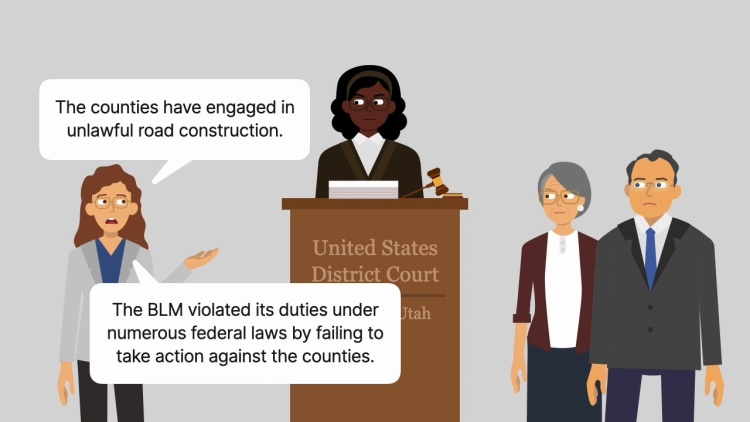Southern Utah Wilderness Alliance v. BLM
United States Court of Appeals for the Tenth Circuit
425 F.3d 735 (2005)
- Written by Melanie Moultry, JD
Facts
In 1996, road crews retained by the Counties of San Juan, Kane, and Garfield (counties) (defendants) graded 16 roads in Utah without prior federal approval. The counties claimed the roads as rights of way under Revised Statute (R.S.) 2477, which granted a right of way for highway construction over public lands not reserved for public use. The roads were located in federal wilderness, national-monument, and national-park areas. The Southern Utah Wilderness Alliance (SUWA) (plaintiff) protested the grading to the Bureau of Land Management (BLM) (defendant), which declined to take action. SUWA sued the counties and the BLM for declaratory and injunctive relief, claiming that the counties had engaged in unlawful road construction and that the BLM’s inaction violated federal law. The BLM filed a crossclaim against the counties, claiming that the road construction constituted trespass and degradation of federal property. Both SUWA and the BLM argued that “construction” under R.S. 2477 referred to mechanical construction rather than continuous public use, because a continuous-public-use standard would result in multiple claims beyond the scope of R.S. 2477. The counties argued that their activities were not trespass, because the activities were conducted within the physical boundaries of the right of way. The district court ruled for SUWA and the BLM, and the counties appealed.
Rule of Law
Issue
Holding and Reasoning (McConnell, J.)
What to do next…
Here's why 907,000 law students have relied on our case briefs:
- Written by law professors and practitioners, not other law students. 47,100 briefs, keyed to 996 casebooks. Top-notch customer support.
- The right amount of information, includes the facts, issues, rule of law, holding and reasoning, and any concurrences and dissents.
- Access in your classes, works on your mobile and tablet. Massive library of related video lessons and high quality multiple-choice questions.
- Easy to use, uniform format for every case brief. Written in plain English, not in legalese. Our briefs summarize and simplify; they don’t just repeat the court’s language.





